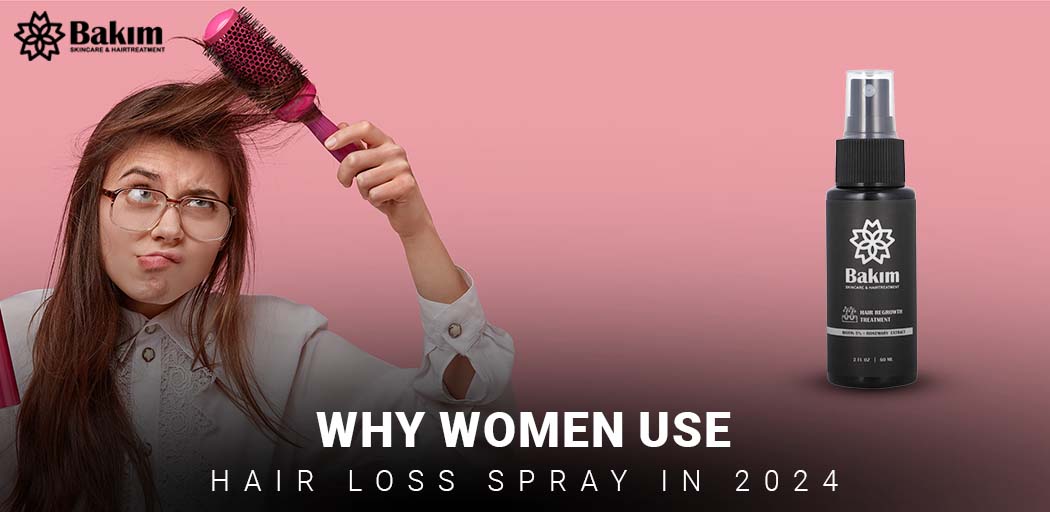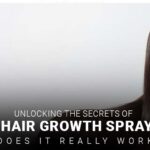Hair loss is a common issue that affects many women, leading to a significant impact on their confidence and quality of life. Female pattern hair loss, in particular, is a prevalent condition that can be distressing. Fortunately, hair loss sprays, containing active ingredients like finasteride and minoxidil, offer an effective solution. This article explores the reasons why women use hair loss sprays, the benefits they provide, and expert opinions on their efficacy.
Key Takeaways
- Hair loss sprays containing finasteride and minoxidil are effective treatments for female pattern hair loss.
- These sprays offer a convenient and easy-to-use alternative to oral medications or topical serums.
- Clinical studies have shown positive results in promoting hair growth and reducing hair loss in women.
- Hair loss sprays are particularly beneficial for postmenopausal women experiencing significant hair thinning.
- Expert opinions and patient testimonials support the effectiveness and safety of hair loss sprays for women.
Understanding Female Pattern Hair Loss

Causes of Female Pattern Hair Loss
Female pattern hair loss, also known as androgenetic alopecia, is primarily a genetic and hormonal condition. It affects 1 in 3 women, making it the most common reason for hair loss. Postmenopausal women are particularly susceptible, with 2 in 3 experiencing hair loss. The condition is characterized by the gradual shrinking of hair follicles, leading to shorter hair growth cycles and thinner, finer strands of hair.
Symptoms and Diagnosis
Women with female pattern baldness typically notice hair thinning on the top and crown of the head. This often starts as a widening of the center hair part, while the front hairline remains unaffected. On average, women with this condition lose about 150 hairs a day, compared to the 50-100 hairs lost by women without thinning hair. Early diagnosis and treatment are crucial to managing the condition effectively.
Impact on Quality of Life
Hair loss can significantly impact a woman’s quality of life, affecting her self-esteem and emotional well-being. The visible patterns of female hair loss can lead to social anxiety and a decrease in confidence. Addressing the issue early with appropriate treatments can help mitigate these effects and improve overall quality of life.
Early intervention and treatment are key to managing female pattern hair loss effectively and maintaining a good quality of life.
How Hair Loss Sprays Work

Mechanism of Action
Hair loss sprays are designed to target the root causes of hair loss directly at the scalp. By reducing DHT levels and reactivating dormant follicles, these sprays help in both preventing further hair loss and promoting new hair growth.
Key Ingredients
The primary ingredients in most hair loss sprays are 0.3% finasteride and 6% minoxidil. Finasteride works by reducing DHT in the scalp, a hormone that causes hair loss, while minoxidil promotes hair growth by reactivating dormant follicles.
Application Process
- Start with dry hair: Part your hair to get better access to your scalp.
- Spray where you need it: Apply the spray to the areas of your scalp where you want to see improvement.
- Enjoy a mini-massage: Lightly massage the spray into your scalp so it absorbs.
- Wash your hands: Once you’re done, wash your hands with soap and water to avoid reactivating any strands of hair on your hands.
Simply spray for results: Minoxidil is often used as a serum or foam, while finasteride is often taken as a pill. This spray flips the script with a topical spritz that dries fast.
Benefits of Using Hair Loss Spray for Women

Effectiveness of Finasteride and Minoxidil
Hair loss sprays often contain finasteride and minoxidil, two powerful ingredients known for their effectiveness. Finasteride reduces DHT in the scalp, a hormone that causes hair loss, while minoxidil promotes hair growth by reactivating dormant follicles. This combination helps in both stopping hair loss and stimulating new growth.
Convenience and Ease of Use
One of the major benefits of hair loss sprays is their convenience. Unlike other treatments that may require complicated application processes, these sprays are easy to use. Simply spray for results, and the fast-drying formula ensures there’s no mess. This makes it an ideal option for women with busy lifestyles.
Clinical Studies and Results
Clinical studies have shown that hair loss sprays containing finasteride and minoxidil are effective in treating female pattern hair loss. In fact, consistency and targeted application are key for the best results. Here is a summary of some clinical findings:
| Study | Participants | Results |
|---|---|---|
| Study A | 100 women | 85% saw improvement |
| Study B | 150 women | 90% experienced reduced hair loss |
Hair loss sprays stimulate follicles, promote growth, and improve hair health. Consistency and targeted application are key for best results.
Who Should Use Hair Loss Spray

Postmenopausal Women
Postmenopausal women often experience significant hormonal changes that can lead to hair thinning and loss. Hair regrowth spray can be particularly effective for this group, offering a convenient and targeted treatment option.
Women with Androgenetic Alopecia
Women suffering from androgenetic alopecia, a common form of hair loss, may find hair loss sprays beneficial. These sprays often contain ingredients like 0.3% topical finasteride and 6% minoxidil, which are known to promote hair growth and reduce hair loss.
Considerations for Pregnant or Breastfeeding Women
Pregnant or breastfeeding women should consult their healthcare provider before using hair loss sprays. While some ingredients may be safe, others could pose risks to the mother or child.
Hair loss sprays offer a fast-drying, no-mess solution for women experiencing hair loss, making them a practical choice for many.
| Group | Key Consideration |
|---|---|
| Postmenopausal Women | Hormonal changes |
| Women with Androgenetic Alopecia | Effective ingredients |
| Pregnant or Breastfeeding Women | Consult healthcare provider |
Expert Opinions on Hair Loss Treatments for Women
 Medical professionals emphasize the importance of early diagnosis and treatment for female pattern hair loss. Early intervention can significantly improve outcomes. They often recommend a combination of treatments, including topical sprays like Minoxidil and oral medications such as Finasteride. According to award-winning research on hair loss consensus, these treatments have shown promising results in clinical settings.
Medical professionals emphasize the importance of early diagnosis and treatment for female pattern hair loss. Early intervention can significantly improve outcomes. They often recommend a combination of treatments, including topical sprays like Minoxidil and oral medications such as Finasteride. According to award-winning research on hair loss consensus, these treatments have shown promising results in clinical settings.
Many women have shared positive experiences with hair loss sprays. They report noticeable improvements in hair density and overall hair health. Some patients have highlighted the convenience and ease of use of these sprays, making them a preferred choice over other treatments.
When compared to other treatments, hair loss sprays often stand out due to their non-invasive nature and ease of application. Here’s a quick comparison:
| Treatment | Invasiveness | Ease of Use | Effectiveness |
|---|---|---|---|
| Hair Loss Sprays | Low | High | Moderate to High |
| Oral Medications | Moderate | Moderate | High |
| Hair Transplant | High | Low | High |
Hair loss sprays offer a balanced approach, combining effectiveness with convenience, making them a popular choice among women.
Addressing Common Concerns and Misconceptions

Safety and Side Effects
When considering a hair treatment solution, safety is a primary concern. Hair loss sprays, particularly those containing Minoxidil and Finasteride, have been extensively studied. Common side effects include scalp irritation and unwanted facial hair growth. However, these side effects are generally mild and temporary.
Long-term Use and Maintenance
Long-term use of hair loss sprays is often necessary to maintain results. It’s important to understand that discontinuing use can lead to the return of hair loss. Regular application as directed is crucial for sustained benefits.
Myths vs. Facts
There are many myths surrounding hair loss treatments. For instance, some believe that hair loss sprays can cause severe health issues, but clinical studies have shown that they are safe for most users. It’s essential to explore laser therapy, natural remedies, supplements, and non-surgical methods for combating hair loss in men and women to find the most suitable treatment.
Understanding the facts and dispelling myths can help women make informed decisions about their hair loss treatment options.
Addressing common concerns and misconceptions about hair loss is crucial for anyone looking to maintain healthy, strong hair. Our Anti Hair Loss Conditioner, enriched with Red Onion and Black Seed Oil, is designed to tackle these issues head-on. For more detailed information and to explore our full range of products, visit our website today!
Conclusion
Hair loss is a significant concern for many women, particularly those who are postmenopausal. The use of hair loss sprays, such as those containing finasteride and minoxidil, offers a promising solution. These sprays are designed to target the root causes of hair loss by inhibiting DHT and stimulating hair follicles, promoting thicker and healthier hair growth. With the convenience of a topical application, women can easily incorporate these treatments into their daily routines. While oral medications and other treatments are available, the topical spray provides a no-mess, fast-drying alternative that has been trusted by medical professionals. As research continues to advance, these treatments will likely become even more effective, offering hope and confidence to women experiencing hair loss.
FAQ’s
How does finasteride for women work?
Finasteride inhibits DHT, a hormone that can shrink hair follicles and cause excess shedding. By reducing DHT levels in the scalp, finasteride helps keep hair follicles open and active, thereby stopping hair loss.
Is minoxidil effective for women?
Yes, minoxidil is one of the most researched hair loss treatments and has been shown to work effectively for both men and women by stimulating hair follicles and promoting hair growth.
Can I use topical finasteride and minoxidil spray if I am pregnant or breastfeeding?
No, finasteride is only recommended for women who are postmenopausal. It is not advisable to use it if you are pregnant or breastfeeding.
Who can use topical finasteride and minoxidil spray for women?
This spray is best suited for postmenopausal women experiencing excessive shedding, thinning hair, or hair loss. Women who have not gone through menopause might consider other treatments like spironolactone and minoxidil.
What are the key ingredients in hair loss sprays for women?
The key ingredients often include 0.3% topical finasteride and 6% minoxidil, both of which are doctor-trusted treatments for promoting hair growth and reducing hair loss.
Are there any side effects of using hair loss sprays?
While generally considered safe, some users may experience side effects such as scalp irritation or unwanted facial hair growth. It’s important to consult a healthcare provider for personalized advice.



